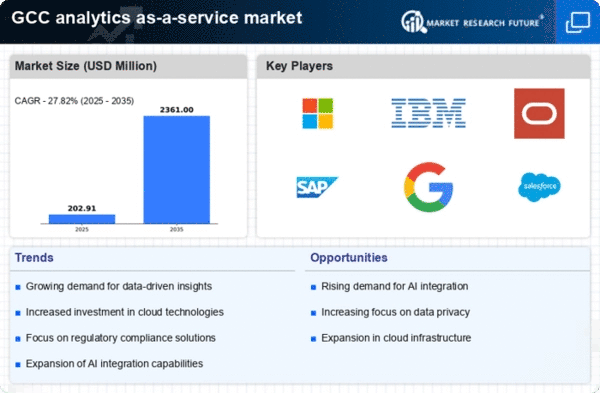Increased Focus on Customer Experience
Enhancing customer experience is a primary focus for many organizations in the GCC, driving growth in the analytics as-a-service market. Companies are increasingly utilizing analytics to gain insights into customer behavior and preferences, enabling them to tailor their offerings accordingly. By leveraging data analytics, businesses can identify trends and patterns that inform product development and marketing strategies. This customer-centric approach is projected to boost customer satisfaction rates by as much as 40%. As organizations strive to build long-lasting relationships with their customers, the analytics as-a-service market plays a crucial role in providing the necessary tools and insights to achieve these goals. Consequently, the integration of analytics into customer experience strategies is likely to become a standard practice across various industries.
Rising Demand for Data-Driven Insights
The analytics as-a-service market is experiencing a notable surge in demand for data-driven insights across various sectors in the GCC. Organizations are increasingly recognizing the value of leveraging data analytics to enhance decision-making processes. According to recent estimates, the market is projected to grow at a CAGR of approximately 25% over the next five years. This growth is driven by the need for businesses to remain competitive and agile in a rapidly changing environment. As companies seek to optimize operations and improve customer experiences, the analytics as-a-service market becomes a critical component in their strategic initiatives. The ability to access real-time analytics allows organizations to respond swiftly to market changes, thereby fostering innovation and efficiency.
Growing Emphasis on Real-Time Analytics
The market is witnessing a growing emphasis on real-time analytics capabilities, which are becoming essential for businesses in the GCC. The ability to analyze data as it is generated allows organizations to make informed decisions quickly, thereby enhancing operational efficiency. Recent studies indicate that companies utilizing real-time analytics can improve their decision-making speed by up to 50%. This trend is particularly relevant in sectors such as retail and finance, where timely insights can lead to competitive advantages. As businesses strive to enhance customer engagement and streamline operations, the demand for real-time analytics solutions within the analytics as-a-service market is expected to rise significantly. This shift not only supports better business outcomes but also fosters a culture of data-driven decision-making across organizations.
Cost Efficiency and Resource Optimization
Cost efficiency remains a pivotal driver for the analytics as-a-service market in the GCC. By adopting analytics as-a-service solutions, organizations can significantly reduce their operational costs associated with data management and analysis. Traditional analytics solutions often require substantial investments in infrastructure and personnel. In contrast, analytics as-a-service offers a subscription-based model that allows businesses to pay only for the services they utilize. This flexibility can lead to savings of up to 30% in operational expenses. Furthermore, organizations can allocate resources more effectively, focusing on core business activities rather than on managing complex analytics systems. As a result, the analytics as-a-service market is increasingly viewed as a viable option for companies aiming to enhance their financial performance while maintaining high-quality data insights.
Advancements in Technology and Infrastructure
Technological advancements and improvements in infrastructure are significantly influencing the analytics as-a-service market in the GCC. The proliferation of cloud computing, big data technologies, and machine learning capabilities has made it easier for organizations to adopt analytics solutions. As businesses increasingly migrate to cloud-based platforms, the analytics as-a-service market is expected to expand rapidly. Recent data suggests that cloud adoption in the region is projected to reach 80% by 2026, further fueling the demand for analytics services. These advancements not only enhance the scalability and flexibility of analytics solutions but also enable organizations to harness vast amounts of data effectively. As a result, the analytics as-a-service market is poised for substantial growth, driven by the continuous evolution of technology and infrastructure.
















